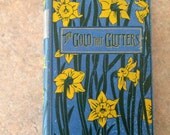Eleanor Maria Ingram
192 pages
genre - Light Horror
my rating - 4 out of 5 stars
The story begins with this: "The house cried out to me for help...this is not the story of a haunted house. It is, or was, a beleaguered house; strangely sieged..."
Wanting to avoid the miserable summer months in New York City, 32-year-old Roger Locke has just purchased a neglected farmhouse in Connecticut. The first time Locke sees the lake on his property, he feels "a shock of violent dislike." And his first night in the house, he surprises an intruder. An intruder that leaves behind a braid of thick, auburn hair!
But Locke is not in danger from the intruder. It is the malevolence that lurks in the lake, that spills over to the house, enveloping the structure with its "hungry malignance". The story is very well told. I was instantly captivated, and my attention was held all the way 'til the end. And I REALLY liked the ending! This would make an awesome movie!
There are no formatting issues with Amazon's ebook. (But I may have been too engrossed in the story!) The book was copyrighted in 1921, so I assume the story occurs in that time period. Locke drives a roadster, uses a flashlight, telephones are common and there was a reference to Armistice Day just occurring.
About the author -
I found very little about Ms. Ingram (1886 - 1921) on the internet, so I will mention a few things about two of her books.
The September 28, 1922 issue of The Christian Century refers to The Thing as “a strange tale that almost suggests Poe,” high praise indeed.
A 1921 issue of the literary magazine Long Lines says “there are passages that bring the hair on the back of your neck straight up to attention.”
Ingram's novel The Unafraid (1913) was made into a silent movie by the same name. It was directed by Cecil B. DeMille and starred Rita Jolivet. Just after filming The Unafraid, Ms. Jolivet sailed on and survived the last voyage of the Lusitania when the ship was torpedoed on 7 May 1915.




